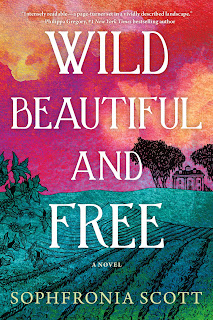Sophfronia Scott is the author of the new historical novel Wild, Beautiful, and Free, a retelling of Charlotte Brontë's classic novel Jane Eyre. Scott's other books include Unforgivable Love. She is the founding director of Alma College's MFA in Creative Writing, and she lives in Sandy Hook, Connecticut.
Q: What inspired you to write this retelling of Jane Eyre
set before and during the American Civil War?
A: Jane Eyre deeply influenced me when I first read it. I was around 13 at the
time. Jane taught me how to think, how to move through the world with agency
and figure out how to have the life I want. I’ve wondered for years what it
would be like to have this powerful character be a woman of color and how, as
such, she might reach so many more women.
When I was thinking of setting, I wanted my character to have similar, if not
more, limitations imposed on her by society. I saw a mixed-race woman, who was
neither wholly black nor wholly white, who could be offered only a lonely
existence because of the way she is viewed by the world. The setting that most
demonstrated that, to me anyway, was Civil War-era America.
Q: How did you create your character Jeannette, and what did
you see as the right balance between your character and Brontë's Jane?
A: Jane is a fiery, passionate character so I knew my Jeannette would be the
same.
The big difference, though, is that I place Jeannette in dangerous situations that Jane would never have encountered. So Jeannette has an action hero aspect where she’s required to step up to protect those she loves and herself. She puts herself in harm’s way and even carries a gun at one point. I wanted Jeannette to be a hero with a capital H.
This story is not just about a girl being sold into slavery, this is about a person who demands her humanity—who knows who she is and who fights to not only have the life that that she feels she wants but to live the emotions that she feels quite deeply.
Q: How was the book's title chosen, and what does it signify
for you?
A: My brilliant editor at Lake Union, Danielle Marshall, came up with the
title. She plucked the words right from my manuscript. “Wild, beautiful, and
free” is how Jeannette describes the eyes of the white man she falls in love
with, Christian Robichaud Colchester. Sometimes we behold what we wish to be.
Jeannette connects with Christian over their mutual love of Louisiana, an area of the United States that had—and kind of still does have—this untamed, other-worldly aspect. She sees his eyes as wild, beautiful, and free because his eyes inspire that sense of herself.
Q: How did you research the 1850s and '60s, and what did you
learn that especially surprised you?
A: With lots of books and a visit to the Whitney Plantation in Louisiana. I
learned that way more slaves escaped in a variety of ways, and that there were
way more slave rebellions than is generally known or taught in schools.
For example, I learned about this enslaved couple, William and Ellen Craft, who, in 1848, devised a daring escape. Ellen, fair-skinned enough to pass for white, disguised herself as a man debilitated by illness. William pretended to be this character’s slave, and together they traveled openly, making it to freedom in Pennsylvania and later a life in Canada and then England.
There’s a new book about them, Master Slave Husband Wife, written by Ilyon Woo, that came out in February 2023 and is now a bestseller. But I learned of the Crafts from a book, Runaway Slaves, that I found while shopping at a used book sale sponsored by my local library and used in my research for Wild, Beautiful, and Free.
Their story electrified me. It felt hopeful and empowering, both elements I wanted to use to elevate the tale of my character Jeannette’s perilous experiences.
Q: What are you working on now?
A: I'm once again diving into issues of race and empathy. It’s a kind of triangle
novel involving the story of a white fighter pilot during World War II, his girlfriend
back home in Louisiana, and a Black woman serving in the Army in the 6888th
troop. She’s one of the Black women who were the only troop that served
overseas in during World War II.
The narrative is going to bring them together in a terrible and destructive way. Who will survive it, and how will their lives change? I love working on it.
Q: Anything else we should know?
A: Seven years after I wrote my first novel, All I Need to Get By, I entered a Master of Fine Arts (MFA) in creative writing program that helped my writing so much that it changed my life.
Before, it was like I knew how to build an airplane in my garage, but after the MFA it was like, “OK, now I can build a rocket ship.” Learning about craft allowed me to wield my creativity with more intention to the point where it took my work to another level.
And now here I am, amazed and grateful to find myself directing an MFA program at Alma College. I know how important an MFA was for me so now this is like a grand “give back” that I get to do to, creating and running a program to help other writers to reach their highest level too. It’s exciting.
--Interview with Deborah Kalb. Here's a previous Q&A with Sophfronia Scott.


No comments:
Post a Comment